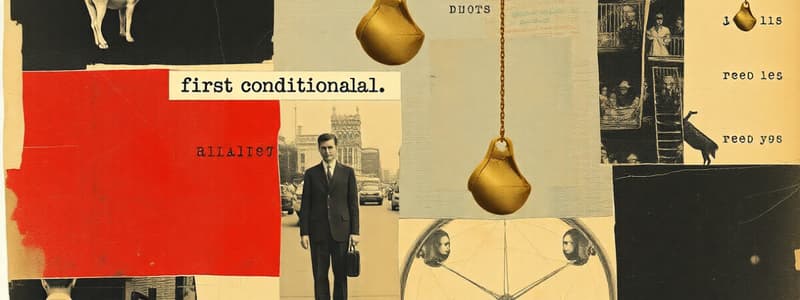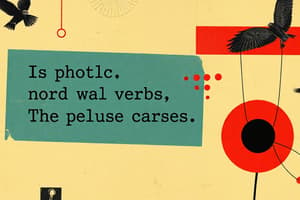Podcast
Questions and Answers
Which of the following sentences correctly uses a modal verb for obligation?
Which of the following sentences correctly uses a modal verb for obligation?
- You mustn’t skip the meeting if you want to stay informed. (correct)
- They might have left early for the party.
- He can’t have forgotten about the appointment.
- She could have enjoyed the concert last night.
Identify the correct form of a defining relative clause.
Identify the correct form of a defining relative clause.
- This is the restaurant where we had dinner last week. (correct)
- He likes to read, which is interesting.
- The book, that she borrowed, was fantastic.
- I met a artist who paints modern art.
What structure correctly represents the 2nd conditional?
What structure correctly represents the 2nd conditional?
- If she works overtime, she will earn more money.
- If he studies hard, he would pass the exam.
- If I were rich, I would travel the world. (correct)
- If they had known, they would have acted differently.
Which sentence exemplifies the correct usage of the 3rd conditional?
Which sentence exemplifies the correct usage of the 3rd conditional?
Which of the following sentences uses 'wish' correctly?
Which of the following sentences uses 'wish' correctly?
Which sentence best represents the reported speech structure?
Which sentence best represents the reported speech structure?
Identify the sentence that uses 'had better' correctly.
Identify the sentence that uses 'had better' correctly.
Select the option that correctly represents the usage of 'used to'.
Select the option that correctly represents the usage of 'used to'.
What is the correct structure for the 1st conditional?
What is the correct structure for the 1st conditional?
Which sentence best illustrates a non-defining relative clause?
Which sentence best illustrates a non-defining relative clause?
Which of the following sentences demonstrates the use of 'might' correctly?
Which of the following sentences demonstrates the use of 'might' correctly?
In the context of wishes, what is the correct form for expressing a desire for a present situation?
In the context of wishes, what is the correct form for expressing a desire for a present situation?
Which sentence correctly uses 'could' in a past context?
Which sentence correctly uses 'could' in a past context?
What is the primary function of modal verbs like 'must' or 'should'?
What is the primary function of modal verbs like 'must' or 'should'?
How is the expression 'had better' correctly used in a sentence?
How is the expression 'had better' correctly used in a sentence?
What does the declaration about the Olimpíada Matemática imply regarding responsibility?
What does the declaration about the Olimpíada Matemática imply regarding responsibility?
What is required from parents or guardians according to the document?
What is required from parents or guardians according to the document?
What type of document appears to require a signature and seal from an authority?
What type of document appears to require a signature and seal from an authority?
Why might the establishment's seal be important on the document?
Why might the establishment's seal be important on the document?
What does the statement regarding knowledge of the current regulations imply?
What does the statement regarding knowledge of the current regulations imply?
What information is NOT required from the parent or guardian in the authorization form?
What information is NOT required from the parent or guardian in the authorization form?
Which of the following items is specifically mentioned as being the responsibility of the parent or guardian?
Which of the following items is specifically mentioned as being the responsibility of the parent or guardian?
In what context is the phrase 'I take responsibility' used in the authorization form?
In what context is the phrase 'I take responsibility' used in the authorization form?
What type of event is the authorization referring to?
What type of event is the authorization referring to?
What is required from the student in the authorization form?
What is required from the student in the authorization form?
How does the authorization form facilitate the participation of the student?
How does the authorization form facilitate the participation of the student?
What does the authorization include regarding the child's participation consequences?
What does the authorization include regarding the child's participation consequences?
What information about the event is the parent or guardian required to provide?
What information about the event is the parent or guardian required to provide?
Flashcards
Modal Verbs
Modal Verbs
Words used to express levels of certainty, possibility, or obligation.
1st Conditional
1st Conditional
Describes something that might happen in the future if a condition is met.
2nd Conditional
2nd Conditional
Expresses an unreal or hypothetical situation and its improbable consequence.
3rd Conditional
3rd Conditional
Signup and view all the flashcards
Defining Relative Clause
Defining Relative Clause
Signup and view all the flashcards
Non-Defining Relative Clause
Non-Defining Relative Clause
Signup and view all the flashcards
Had better (not)
Had better (not)
Signup and view all the flashcards
Wish/If only
Wish/If only
Signup and view all the flashcards
Should/Shouldn't
Should/Shouldn't
Signup and view all the flashcards
Must/Mustn't
Must/Mustn't
Signup and view all the flashcards
Could/Couldn't
Could/Couldn't
Signup and view all the flashcards
Can't
Can't
Signup and view all the flashcards
Might
Might
Signup and view all the flashcards
May
May
Signup and view all the flashcards
What is the purpose of the document?
What is the purpose of the document?
Signup and view all the flashcards
What is a disclaimer?
What is a disclaimer?
Signup and view all the flashcards
Why is the document signed by parents or guardians?
Why is the document signed by parents or guardians?
Signup and view all the flashcards
What is the role of the establishment?
What is the role of the establishment?
Signup and view all the flashcards
What does the document emphasize?
What does the document emphasize?
Signup and view all the flashcards
Authorization Form
Authorization Form
Signup and view all the flashcards
Participant's Information
Participant's Information
Signup and view all the flashcards
Guardian's Information
Guardian's Information
Signup and view all the flashcards
Event Details
Event Details
Signup and view all the flashcards
Responsibility Clause
Responsibility Clause
Signup and view all the flashcards
Student's School Information
Student's School Information
Signup and view all the flashcards
Electronic Mail (E-mail)
Electronic Mail (E-mail)
Signup and view all the flashcards
Authorization Signature
Authorization Signature
Signup and view all the flashcards
Study Notes
Modal Verbs
- SHOULD/SHOULDN'T: Used to express advice or obligation. Example: If you feel sick, you should go to the doctor.
- MUST/MUSTN'T: Expresses strong obligation or prohibition. Example: I was so drunk, I must have done something stupid.
- COULD/COULDN'T: Expresses possibility or inability. Example: He could have gone to the supermarket.
- CAN'T: Expresses impossibility. Example: They can't have passed the exam, they didn't study at all.
- MIGHT: Expresses possibility. Example: She might love cats, she has a pencil case with a lot of drawings of them.
- MAY: Expresses possibility. Example: He may have studied, he passed the test.
Relative Clauses
- Defining: Provide essential information. Example: We don't often see the people who live across the hall.
- Non-Defining: Provide extra information. Example: Robert Downey Jr., who played Iron Man, was in jail.
First Conditional
- Structure: If + present simple, will + present simple.
- Example: If he does his homework, he will pass.
Second Conditional
- Structure: If + past simple, would + main verb.
- Example: If I died tomorrow, I would want to restart my life as a butterfly.
Third Conditional
- Structure: If + past perfect, would have + past participle.
Wish/If Only
- Structure: If only + past simple, or wish + past simple.
- Example: If only I putted more attention in class.
Reported Speech
- Converting direct speech to indirect speech.
Had Better/Had Better Not
- Used to give advice or warnings.
- Example: You had better do your laundry before I get home.
Used To
- Expresses past habits.
- Example: I used to get up at 6 o'clock.
Studying That Suits You
Use AI to generate personalized quizzes and flashcards to suit your learning preferences.




